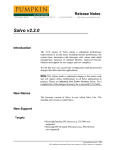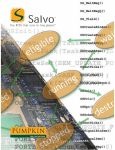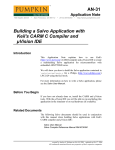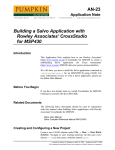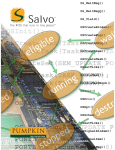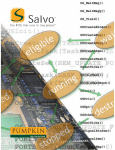Download RM-KC51 Salvo Compiler Reference Manual – Keil
Transcript
RM-KC51 Reference Manual 750 Naples Street • San Francisco, CA 94112 • (415) 584-6360 • http://www.pumpkininc.com Salvo Compiler Reference Manual – Keil Cx51 © Copyright 2003 Pumpkin, Inc. last updated on Apr 23, 2004 All trademarks mentioned herein are properties of their respective companies. Reference Manual Introduction This manual is intended for Salvo users who are targeting 8051 family MCUs with Keil's (http://www.keil.com/) Cx51 C compiler. Related Documents The following Salvo documents should be used in conjunction with this manual when building Salvo applications with Keil's Cx51 C compiler: Salvo User Manual Application Note AN-13 Application Note AN-16 Example Projects Example Salvo projects for use with Keil's Cx51 C compiler and Keil's µVision2 IDE can be found in the: \salvo\ex\ex1\sysi \salvo\tut\tu1\sysi \salvo\tut\tu2\sysi \salvo\tut\tu3\sysi \salvo\tut\tu4\sysi \salvo\tut\tu5\sysi \salvo\tut\tu6\sysi directories of every Salvo for 8051 family distribution. Features Table 1 illustrates important features of Salvo's port to Keil's Cx51 C compiler. 2 RM-KC51 Salvo Compiler Reference Manual – Keil Cx51 Reference Manual general Salvo Lite, LE & Pro for 8051 family all 8051 derivatives portkc51.h port8051.c SYSI available distributions supported targets header file(s) other target-specific file(s) project subdirectory name(s) salvocfg.h compiler auto-detected? yes 1 libraries \salvo\lib subdirectory kc51 context switching function-based via OSCtxSw() no method _OSLabel() required? size of auto variables and function parameters in tasks unrestricted memory memory models supported memory types for Salvo's global objects compact, small and large data, idata and xdata interrupts2 controlled via interrupt status preserved in critical sections? method used nesting limit alternate methods possible? EA configuration-dependent configuration-dependent configuration-dependent 3 3 different methods are used debugging source-level debugging? only in source-code builds compiler bitfield packing support? printf() / %p support? va_arg() support? yes yes / yes yes Table 1: Features of Salvo Port to Keil's Cx51 C Compiler Compiler Optimizations Incompatible Optimizations Optimizer level 9 (common block subroutine packing) is incompatible with OSCtxSw() (present in all Salvo tasks). However, this is handled automatically4 in portkc51.h, so the user need not be concerned with it. I.e. optimizer level 9 can be applied globally to any Salvo source files or source files that call Salvo services. RM-KC51 Salvo Compiler Reference Manual – Keil Cx51 3 Reference Manual Libraries Nomenclature The Salvo libraries for Keil's Cx51 C compiler follow the naming convention shown in Figure 1. sfc51siab.lib variant a: fns called from anywhere, simultaneously b: fns called from background only e: fns called from background or foreground Salvo library type f: freeware l: standard c51/cx51 c51: use with normal Linker (BL51) cx51: use with Extended Linker (LX51) memory model c: compact l: large s: small configuration a: multitasking with delays and events d: multitasking with delays e: multitasking with events m: multitasking only t: multitasking with delays and events, tasks can wait with timeouts memory type for global Salvo objects d: data - for targets with 128 bytes RAM i: idata - for targets with 256 bytes RAM x: xdata - for targets with external RAM Figure 1: Salvo Library Nomenclature – Keil's Cx51 C Compiler Type Salvo Lite distributions contain freeware libraries. All other Salvo distributions contain standard libraries. See the Libraries chapter of the Salvo User Manual for more information on library types. Target (c51/cx51) No target-specific identifiers are required. However, when using the BL51 standard linker, the appropriate libraries contain c51 in their names. When using the LX51 extended linker, the appropriate libraries contain cx51 in their names. A mismatch will cause DATA TYPES DIFFERENT warnings. Memory Model Keil's Cx51 C compiler's compact, small (Cx51 default) and large memory models are supported. In library builds, the memory model applied to all of the source files must match that used in the library – a mismatch will generate a link-time error with an obvious message. For source-code builds, the same memory model must be applied to all of the source files. 4 RM-KC51 Salvo Compiler Reference Manual – Keil Cx51 Reference Manual Note Unlike the library configuration and variant options specified in the salvocfg.h file for a library build, none is specified for the selected memory model. Therefore particular attention must be paid to the memory model settings used to build an application. The memory model is usually specified on a project-wide basis in the µVision2 IDE. Memory Type for Global Salvo Objects Salvo's global objects can be placed anywhere within the 8051's RAM data space, as shown in Table 2. memory type code d / OSD: i / OSI: x / OSX: description Salvo's global objects will be placed within the first 128 bytes of RAM (the data RAM area) Salvo's global objects will be placed within the first 256 bytes of RAM (the idata RAM area) Salvo's global objects will be placed anywhere within external RAM (the xdata RAM area) Table 2: Memory Types for Salvo Libraries – Keil's Cx51 C Compiler The code required to access Salvo's global objects (e.g. the task control blocks, or tcbs) will vary in size and speed depending on where the objects are located. Since the internal RAM of the 8051 is often used for the system's stack, function parameters and auto variables, in larger applications it may be necessary to place Salvo's global objects in external RAM. Configuration Different library configurations are provided for different Salvo distributions and to enable the user to minimize the Salvo kernel's footprint. See the Libraries chapter of the Salvo User Manual for more information on library configurations. RM-KC51 Salvo Compiler Reference Manual – Keil Cx51 5 Reference Manual Variant The Salvo libraries for Keil's Cx51 C compiler implement different methods of controlling interrupts. Each is designed for minimal code size. The different variants – and how they control interrupts – are outlined in Table 3. variant code a / OSA: b / OSB: e / OSE: description Applicable services can be called from anywhere, i.e. from the foreground and the background, simultaneously. Global interrupts will be disabled (EA = 0) during critical sections, and restored thereafter. Unlimited nesting is permitted. OSPRESERVE_INTERRUPT_MASK is TRUE. Applicable services may only be called from the background (default). Global interrupts will be blindly disabled (EA = 0) during critical sections. Nesting is not permitted. OSPRESERVE_INTERRUPT_MASK is FALSE. Applicable services may only be called from everywhere, i.e. from the foreground or the background, but not simultaneously.. Global interrupts will be disabled (EA = 0) during critical sections, and restored thereafter. Nesting is not permitted. OSPRESERVE_INTERRUPT_MASK is TRUE. Table 3: Variants for Salvo Libraries – Keil's Cx51 C Compiler If your application does not call any Salvo services from within interrupts, use the b variant. If you wish to call applicable services from within interrupts or from the background level – but never simultaneously and without any nested interrupts – use the e variant. If you don't want any restrictions placed on how you call Salvo services, use the a variant. In each case, you must call the services that you use from the correct place in your application, or either the linker will generate an error or your application will fail during runtime. The a-variant libraries are the most versatile, but they are also the largest because of the on-stack saving of IE and the reentrant keyword that is applied to appropriate Salvo services. The e-variant libraries are smaller because reentrancy is not used. The b-variant libraries are smaller still. 6 RM-KC51 Salvo Compiler Reference Manual – Keil Cx51 Reference Manual See the OSCALL_OSXYZ configuration parameters for more information on calling Salvo services from interrupts. Build Settings Salvo's libraries for Keil's Cx51 C compiler are built using the default settings outlined in the Libraries chapter of the Salvo User Manual. Target-specific settings and overrides are listed in Table 4. compiled limits max. number of tasks max. number of events 5 max. number of event flags max. number of message 6 queues 3 5 1 1 target-specific settings delay sizes idling hook interrupt-enable bits during critical sections message pointers Salvo objects system tick counter task priorities watchdog timer 8 bits enabled EA = 0 can point to idata as per library's memory type available, 32 bits enabled not affected Table 4: Build Settings and Overrides for Salvo Libraries for Keil's Cx51 C Compiler Note The compiled limits for tasks, events, etc. in Salvo libraries can be overridden to be less (all Salvo distributions) or more (all Salvo distributions except Salvo Lite) than the library default. See the Libraries chapter of the Salvo User Manual for more information. Available Libraries There are 540 Salvo libraries for Keil's Cx51 C compiler. 270 are for use with the BL51 linker, and 270 for use with the LX51 linker. Each Salvo for 8051 family distribution contains the Salvo libraries of the lesser distributions beneath it. RM-KC51 Salvo Compiler Reference Manual – Keil Cx51 7 Reference Manual salvocfg.h Examples Below are examples of salvocfg.h project configuration files for different Salvo for 8051 distributions targeting a generic 8051. Note When overriding the default number of tasks, events, etc. in a Salvo library build, OSTASKS and OSEVENTS (respectively) must also be defined in the project's salvocfg.h. If left undefined, the default values (see Table 4) will be used. Salvo Lite Library Build #define #define #define #define #define OSUSE_LIBRARY OSLIBRARY_TYPE OSLIBRARY_GLOBALS OSLIBRARY_CONFIG OSLIBRARY_VARIANT TRUE OSF OSD OSA OSB Listing 1: Example salvocfg.h for Library Build Using sfc51sdab.lib Salvo LE & Pro Library Build #define #define #define #define #define OSUSE_LIBRARY OSLIBRARY_TYPE OSLIBRARY_GLOBALS OSLIBRARY_CONFIG OSLIBRARY_VARIANT TRUE OSL OSD OSA OSB Listing 2: Example salvocfg.h for Library Build Using slc51sdab.lib Salvo Pro Source-Code Build #define #define #define #define #define OSENABLE_IDLING_HOOK OSENABLE_SEMAPHORES OSEVENTS OSLOC_ALL OSTASKS TRUE TRUE 1 data 3 Listing 3: Example salvocfg.h for Source-Code Build 8 RM-KC51 Salvo Compiler Reference Manual – Keil Cx51 Reference Manual Performance Memory Usage tutorial memory usage7 total ROM8 total RAM9 151 275 305 674 1026 1278 1159 23 23 25 35 52 57 53 tu1lite tu2lite tu3lite tu4lite tu5lite tu6lite tu6pro10 Table 5: ROM and RAM requirements for Salvo Applications built with Keil's Cx51 C Compiler Special Considerations 8051 Target Compatibility An extraordinary variety of 8051-type MCUs are available. Many have extended memory ranges beyond the typical data, idata and xdata spaces. Salvo is source-code compatible with all of the 8051 family devices that Keil's Cx51 C compiler supports. Salvo's libraries are compatible with all 8051 variants that have RAM in the data, idata or xdata spaces. Alternate Memory Mappings for Source-Code Builds To place Salvo's global objects in a different RAM space in a source-code build, redefine OSLOC_ALL (default: idata) or individual OSLOC_XYZ configuration options. To change what Salvo's message pointers can point to, redefine OSMESSAGE_TYPE (default: idata). Memory Map Issues Involving RAM Address 0x0000 Certain Cx51 memory attributes (e.g. the xdata space) include the ability to place global variables at an address of 0x0000. If the global Salvo object placed at address 0x0000 is pointed to RM-KC51 Salvo Compiler Reference Manual – Keil Cx51 9 Reference Manual anywhere in the Salvo code, Salvo's runtime error checking will interpret the pointer as a NULL pointer and will reject the operation (e.g. creating an event flag whose event flag control block is located at 0x0000). This can cause confusion, as code that locates some or all of Salvo's global objects in one memory space (e.g. the data space) may not work correctly when the memory space is changed (e.g. to xdata) because of a difference in the valid address ranges in the two data spaces. All of Salvo's global objects are located in Salvo's mem.c. The objects are arranged in mem.c such that the first object, OScTcbP, can be located at a memory address of 0x0000 without causing any runtime problems.11 No other Salvo global objects may be located at address 0x0000. Effect of Random Linktime Global Object Arrangement As an example, Figure 2 illustrates the memory locations for Salvo's global objects for a Salvo project built with OSLOC_ALL set to xdata in the project's salvocfg.h. By default, the BL51 linker arranges the global objects as it sees fit, not necessarily in the order in which they are declared in the source code: [SNIP] ------C:0000H X:0000H X:0004H X:000EH X:0010H X:0022H X:0024H X:0026H X:0028H X:0029H ------[SNIP] MODULE SYMBOL PUBLIC PUBLIC PUBLIC PUBLIC PUBLIC PUBLIC PUBLIC PUBLIC PUBLIC ENDMOD MEM _ICE_DUMMY_ OSefcbArea OSecbArea OSdelayQP OStcbArea OSsigQinP OSsigQoutP OSeligQP OSlostTicks OScTcbP MEM Figure 2: Salvo's Global Objects Located in the xdata Memory Space in Random Order In Figure 2, the first of Salvo's event flag control blocks (efcbs) in the OSefcbArea array is located at 0x0000 (equivalent to NULL when used as a pointer). The project compiles successfully, but does not operate correctly with regard to the first event flag (at OSEFCBP(1)). This is because Salvo's event flag services, which take a pointer to the efcb as a parameter, reject a NULL pointer as being invalid, and return an error code. 10 RM-KC51 Salvo Compiler Reference Manual – Keil Cx51 Reference Manual Solution #1: Keep Salvo's Global Objects in Order By selecting Keep variables in order under µVision's Project → Options → C51,12 Salvo's global objects in mem.c will be arranged in the intended order, with OScTcbP first: [SNIP] ------C:0000H X:0000H X:0002H X:0014H X:0016H X:0020H X:0022H X:0024H X:0028H X:002AH ------[SNIP] MODULE SYMBOL PUBLIC PUBLIC PUBLIC PUBLIC PUBLIC PUBLIC PUBLIC PUBLIC PUBLIC ENDMOD MEM _ICE_DUMMY_ OScTcbP OStcbArea OSeligQP OSecbArea OSsigQinP OSsigQoutP OSefcbArea OSdelayQP OSlostTicks MEM Figure 3: Salvo's Global Objects Located in the xdata Memory Space in Specified Order By ensuring that OScTcbP is at 0x0000, all issues with NULL pointers and Salvo's global objects are avoided. Solution #2: Specify xdata Memory Range(s) By selecting Off-chip Xdata memory Start and Size under µVision's Project → Options → Target, one can avoid placing any of Salvo's global objects at 0x000. For example, by starting the xdata space at 0x0004, we get the memory map below: [SNIP] ------C:0000H X:0004H X:0008H X:0012H X:0014H X:0026H X:0028H X:002AH X:002CH X:002DH ------[SNIP] MODULE SYMBOL PUBLIC PUBLIC PUBLIC PUBLIC PUBLIC PUBLIC PUBLIC PUBLIC PUBLIC ENDMOD MEM _ICE_DUMMY_ OSefcbArea OSecbArea OSdelayQP OStcbArea OSsigQinP OSsigQoutP OSeligQP OSlostTicks OScTcbP MEM Figure 4: Salvo's Global Objects Located in the xdata Memory Space with a Specified Non-zero Start Address Once again, since there is no Salvo global object at 0x0000, all issues with NULL pointers and Salvo's global objects are avoided. RM-KC51 Salvo Compiler Reference Manual – Keil Cx51 11 Reference Manual Solution #3: Reserving xdata Space By reserving some RAM in the xdata space via the DS assemblylanguage directive, you can ensure that none of Salvo's global objects are placed at 0x0000: xseg at 0 XNULL: DS 0x10 Figure 5: Assembly-Language Directives to Avoid placement of any Salvo Objects at 0x0000 By placing the snippet in Figure 5 in an assembly-language module that is built as part of the project, an absolute xdata segment that's 16 bytes long will be created, and the linker will place it at address xdata:0000. Other relocatable segments (e.g. the segment for Salvo's mem.c) will be located after it, thus guaranteeing that none of Salvo's global objects are located at 0x0000 and all issues with NULL pointers and Salvo's global objects are avoided. Bank Switching Salvo is compatible with Cx51's code banking (also called bank switching), with certain restrictions. Overview The dispatching of tasks via the Salvo scheduler and contextswitcher is likely to be incompatible with the bank switching implemented via Cx51's L51_BANK.A51 assembly-language module. Therefore the Salvo scheduler, context-switcher and tasks themselves must be located in the common (code) area. Note To maximize the available space in the common area, it's recommended that user modules containing Salvo tasks contain no other user functions. In all cases, user functions called by Salvo tasks are not restricted in terms of their code locations – they can be in the common area, or in banked areas. Recommended Practice It is recommended that all Salvo modules, as well as all modules containing Salvo tasks, be placed in the common area. This will maximize Salvo's performance by avoiding the bank-switching overhead that would occur if any of Salvo's user services or 12 RM-KC51 Salvo Compiler Reference Manual – Keil Cx51 Reference Manual internal services are located in a bank. Because of Salvo's small ROM footprint, many applications can accommodate Salvo and Salvo tasks in the common area. Note The BL51/Lx51 linker/locator always places program sections of runtime libraries in the common area. Therefore applications built with Salvo libraries will automatically have the Salvo code placed in the common area. In this case, the user must also ensure that the Salvo tasks themselves are placed in the common area. Alternative Practice If space in the common area is at a premium, one possible alternative for Salvo Pro users is to do a source-code build, and locate all of Salvo's source modules except those containing the scheduler and the context-switcher in a banked area. Salvo tasks would still need to be located in the common area. Preserving Interrupt Masks When OSPRESERVE_INTERRUPT_MASK is set to TRUE (the default), Salvo initially saves and later restores the register IE on the stack as part of disabling interrupts in critical sections. This has a substantial impact on Salvo code size – therefore it should only be used in source-code builds if / when you intend to call one or more Salvo services from the foreground / interrupt level. Multiple Callgraphs, Reentrancy, etc. Keil's Cx51 C compiler does not pass parameters and auto variables on the stack unless a function is declared as reentrant. Salvo services that can be called from the foreground / interrupt level are made reentrant by defining the associated OSCALL_OSXYZ configuration option to be OSFROM_ANYWHERE. 1 2 3 This is done automatically through the __C51__ and __CX51__ symbols defined by the compiler. See Variant. OSEnter|LeaveCritical() can be re-written to control particular interrupt bits when OSPRESERVE_INTERRUPT_MASK is TRUE. RM-KC51 Salvo Compiler Reference Manual – Keil Cx51 13 Reference Manual 4 5 6 7 8 9 10 11 12 14 Level 9 optimizations are automatically disabled in any source module that contains a Salvo context switch when OSPRESERVE_INTERRUPT_MASK is TRUE. Each event flag has RAM allocated to its own event flag control block. Each message queue has RAM allocated to its own message queue control block. Salvo v3.2.0 with Cx51 v7.00A In bytes, as reported under Program Size: data=dd xdata=xx code=cc. In bytes, idata, as reported under Program Size: data=dd xdata=xx code=cc. Salvo Pro build differs slightly from Salvo Lite build due to configuration – see tutorial's salvocfg.h. OScTcbP is never referenced by pointer in the Salvo code. The command-line control directive ORDER has the same effect. RM-KC51 Salvo Compiler Reference Manual – Keil Cx51



















